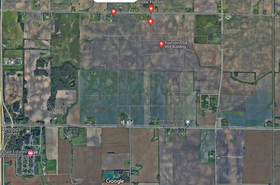Google plans to expand its operations in Germany with €1 billion ($1.18bn) worth of investments in new data centers in the country.
The search giant this week said it would expand its Cloud Region in Frankfurt in a new Google-owned Hanau facility and launch a new region in Berlin-Brandenburg.
“Between now (2021) and 2030, this investment in digital infrastructure and clean energy will total approximately €1 billion,” the company said in a blog.
The new facility in Hanau, located outside Frankfurt, will be operational in 2022. Developed by NDC-Garbe, the four-story building measures 10,000 square meters (107,600 sq ft). The facility reportedly has a combination of adiabatic and dry cooling modes to mitigate risk of water scarcity
“We are very proud to take this important milestone at NDC-GARBE and to create a significant footprint in the Frankfurt region,” Spyridon Linardakis, Managing Director of NDC-GARBE, said last year when announcing the project for the then-unnamed client. “Our focus now is on the execution and delivery in time and on budget.”
“We are very pleased about the symbolic handover of the keys to the building here in Hanau to Google Cloud,” added Hanau Mayor Claus Kaminsky.
The new Berlin-Brandenburg Cloud region will be Google’s second in Germany. The company didn’t provide a timeline for when the region would come online or facility details.
“Designed and dedicated to providing enterprise services and products for Google Cloud customers of all sizes and industries in Germany, the Berlin-Brandenburg region will have three zones to protect against service disruptions,” the company said.
Bernd Leukert, Chief Technology, Data and Innovation Officer and Member of the Management Board at Deutsche Bank, added: “We welcome the new Google Cloud region in Germany, which will enable us to deliver additional resilience and performance for our German client base.”
The company has also selected Engie Deutschland as its carbon-free energy supplier in Germany.






